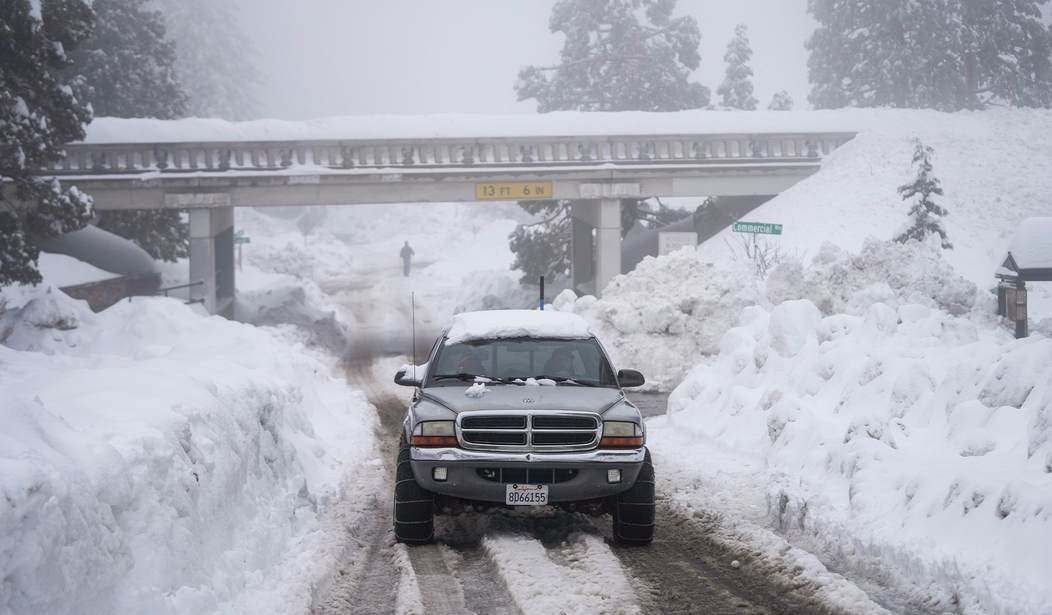Remember last winter? The infamous polar vortex was back in town, looking to freeze some folks. Temperatures across most of the lower 48 dropped repeatedly into the deep freeze. In some places, the mercury dropped clean off the scale and was reduced to a little silver nub rattling around in the bottom of the thermometer. Or course, here in the Great Land, when the lower 48 was freezing, the same jet stream that drove Arctic air down over the lower states was pulling warm, wet Pacific air up over Alaska, which meant that while the lower 48 was shivering, we were sliding around on packed ice with a layer of rainwater over it. Ice cleats and tire chains were the order of the day for our unusually mild winter.
It was a weird winter. And, of course, the climate scolds wasted no time blaming it on climate change, saying that the jet stream's misbehavior was due to their bugaboo. There's just one problem:
It wasn't. Climate Realism's Linda Leuken has details.
NewScientist, a publication dedicated to popularizing science, recently published a post titled “Extreme winter weather isn’t down to a wavier jet stream,” reporting on a new study that shows, the jet stream is not getting wavier in winter months due to climate change. This is true, and it has been evident for some time, but runs counter to assertions commonly made by climate alarmists.
NewScientist writes that “[i]ncreasingly erratic winter weather in the northern hemisphere isn’t a result of the polar jet stream getting more wavy, according to new research . . ..”
As it happens, there is data on the jet stream going back many years. It's not something we are just now beginning to understand, and we have been measuring temperatures, summer and winter, for even longer. Climate Realism has been doing benchmark work in debunking the claims of the scolds, and they do so with data, like looking at trends in severe winter weather going back to the mid-19th century.
The new reports findings are not actually that “new,” in the sense that Climate Realism has reported on research that came to the same conclusion several times in the past few years, here, here, and here, for instance. There is copious evidence showing that not only are cold snaps not uncommon, but that the jet stream’s (and more specifically, polar vortex) influence on extreme winter weather has been acknowledged since at least 1853. Years of studies looking at the frequency of and intensity of polar vortex events have found no consistent trends. As pointed out by my colleague Anthony Watts in this post on the subject, “a 2021 study in the journal Geophysical Research Letters found no statistically significant increase in jet stream waviness or meandering in recent decades,” and he explains there has never been a consensus among scientists when it comes to the issue of polar vortex/jet stream behavior.
In summary, it gets cold in the winter, and some years it gets colder than others. This applies to summer, too. It gets hot in summer, and some years it gets hotter than others. Some springs are drier than usual, some autumns, rainier.
That's called weather. Weather patterns, on the global scale and over time, make the climate. One season's data can't show climate changes, which happen (at minimum) over decades. Pointing at one unusually cold winter and shouting about climate change makes no sense.
The plural of "anecdote" is not "data."
See Also: Weather Warning: Baby It's (Going to Be) Cold Outside
Deep Freeze: Most of the US Needs to Prepare Itself As Polar Vortex 2.0 Comes to Town
What the climate scolds are using to try to make us go back to a mid-19th-century lifestyle is an argument that there are trends - you know, change - in our long-term climate measurements. The problem is, every claim they make ends up being wrong. Every prediction they make, ranging from Thomas Malthus to Greta "Doom Pixie" Thunberg, ends up being wrong. When was it that climate scold Al Gore predicted that there was a 75% chance the polar ice caps would be gone? 2016. Nine years ago. Want to know when there were little or no polar ice caps? The Oligocene, 23 to 34 million years ago. No titanotheres were cooking on gas stoves or driving pickup trucks in the Oligocene.
Through most of Earth's history, it has been warmer than it is now. And throughout the time we've been watching it, the behavior of the jet stream, which drives the occasional polar vortex, hasn't changed measurably, and hasn't shown any trends.
The NewScientist article, while admitting that last winter's chill wasn't due to climate change, still blasts out a fair helping of climate panic-mongering. But, at least, we're seeing a little reality intrude.
Should you so desire, you can read the NewScientist piece here.














